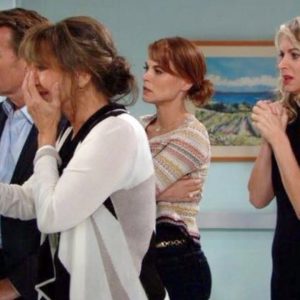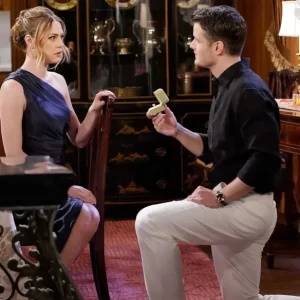Hello, devoted Young and the Restless fans!
Few daytime legends shine as brightly as Tracey E. Bregman, the glamorous and fiery Lauren Fenmore Baldwin. For decades, she’s captivated viewers with her resilience, elegance, and ability to rise from the ashes of Salem’s fiercest rivalries. But behind her glitz and iconic status lies a chilling chapter in both her career and personal life—one that Tracey recently revealed left her shaken to the core.
In a jaw-dropping confession on The Soapy Podcast, Tracey admitted that her early years as Lauren, when she played Genoa City’s ultimate “Queen of Mean,” didn’t just stir up drama onscreen—it actually put her real life in danger.
Lauren Fenmore: From Mean Girl to Soap Icon
Longtime fans remember that Lauren wasn’t always the polished, respected businesswoman we see today. In the 1980s, she was the quintessential mean girl, tormenting Traci Abbott (Beth Maitland) in one of daytime television’s most infamous bullying arcs.
The storyline struck a deep chord with viewers. Lauren relentlessly targeted Traci’s insecurities, particularly about her weight. The dialogue was biting, the cruelty relentless, and the emotional fallout raw. For soap fans, it made for gripping drama; for Tracey Bregman, it was both painful and transformative.
“Beth will tell you, I cried more than she did,” Tracey confessed. Despite the venom she had to spit out as Lauren, she and Beth were—and remain—dear friends. That closeness made it even harder to deliver lines meant to wound. At times, Tracey admitted, she could barely bring herself to speak the words aloud.
Yet she powered through because the story mattered. It was authentic, it was emotional, and it sparked conversations that television of that era rarely dared to explore: bullying, body image, and the scars of cruel words.

The Rivalry That Defined an Era
Of course, Y&R’s writers didn’t stop at verbal sparring. Who could forget the infamous catfight between Lauren and Traci over Brad Carlton (Don Diamont)? The claws came out, emotions boiled over, and fans were left gasping as two of Genoa City’s strongest women went head-to-head in a way only soaps can deliver.
Those rivalries made Lauren unforgettable—but they also blurred the line between fiction and reality for some fans.
When Fiction Crossed Into Reality
During the podcast, Tracey dropped a bombshell she had kept under wraps for years:
“I would get death threats,” she revealed quietly. “People would try to run me off the freeway. It was bad. There were some bad parts of it that I never really talked about.”
Let that sink in. For doing her job—delivering lines written for her character—Tracey’s safety was at risk.
Her co-stars, Christian LeBlanc (Michael Baldwin), Greg Rikaart (Kevin Fisher), and special guest Rebecca Budig (ex-Greenlee, AMC; ex-Hayden, GH), were visibly stunned. They pressed her: Did she tell producers? Did the show intervene?
Tracey admitted she didn’t. Why? Because the bullying storyline was considered too important. It was groundbreaking television, pushing the envelope, and she didn’t want to risk undermining its impact.
In other words, she put the story first—even while facing real danger.
The Emotional Toll of Playing a Villain
This revelation is a sobering reminder of the emotional and psychological toll soap actors endure. Daytime television is unique because it airs five days a week, 52 weeks a year. Characters become woven into viewers’ lives so seamlessly that many fans forget the truth:
Actors are not their characters.
Tracey Bregman is not Lauren Fenmore. Yet to some fans, the cruelty of Lauren was indistinguishable from the woman delivering those lines.
This disconnect, fueled by the intimacy of daytime TV, can have terrifying results—like the ones Tracey endured.





